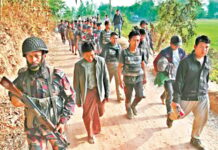Wrapping his two-year-old daughter in a towel, Jiraman Ali was walking fast towards a medial camp near their temporary shelter at Balukhali in Ukhia.
He looked pale and tired as the child, Jashmin Ara Bibi, had been running a high fever for the last four days.
“We took her to the camp two days ago. Doctors there gave her some syrup. She is taking it on time but the temperature is not coming down,” said the Rohingya man as the baby girl kept coughing with a stuffy nose.
Eleven days ago, Ali, in his 30s, along with five of his family members arrived in Bangladesh fleeing persecution in Maungdaw. As usual, their journey was not smooth. First, they had to walk down the hills for days and then ride a rickety wooden fishing boat to cross the Naf river.
During the journey, Ali’s eldest son badly hurt himself falling off a slope and was taking medicines. But the man told The Daily Star yesterday he was terrified that his baby girl was not improving.
Like Jashmin, children living at temporary Rohingya shelters in Ukhia and Teknaf of Cox’s Bazar are falling ill every day mainly due to unhealthy living conditions and lack of safe drinking water, say doctors. The hot and humid weather was only increasing their woes.
Fever, respiratory tract infection, cough, dysentery, diarrhoea and skin diseases are spreading among the Rohingyas, especially the children, say the doctors at the medical camps set up by the government and non-government organisations (NGOs).
The exact number of the children fallen sick is hard to come by, but the doctors say they are grappling with a huge number of patients, mostly children.
The scorching heat during the daytime was making the life of the Rohingyas extremely difficult. Also, their makeshift shacks with polythene roofs were hardly able to save them from the rain. Probably, these were making the refugees, even the adults, sick, according to the physicians.
Many others fell sick because they had days of starvation during their perilous journey to Bangladesh.
“During the daytime, we feel like being roasted inside the shack. We bathe in our own sweat,” Sanjida, a 33-year-old Rohingya woman, told this correspondent near the crowded medical camp at Balukhali yesterday afternoon.
Her four-year-old son was suffering from diarrhoea and got prickly heat all over his body.
“During the night, we place large pieces of polythene over our muddy floor and sleep on them. It’s quite cold there and we’ve got nothing to keep us warm,” she said, adding, they could not bring anything with them as they had to flee for their lives in Myanmar.
“Things get even worse when it rains. The polythene over our head either gets washed away or rainwater leaks through it. We get drenched every time it rains.”
Sanjida lamented that she was not being able to properly feed her ailing son. “We’re eating whatever we’re being given as relief. We are surviving somehow; but the lack of drinking water is our biggest problem.”
The number of tube wells set up for the Rohingyas is inadequate, she added.
At the camp in Bagguna of Palangkhali union, Rohingya woman Suraiya found out a unique way to keep her ailing sons — Osman and Saifat — cool amid the scorching heat.
The mother covered the babies with leaves of a tree. “The green leaves won’t let the heat go in,” she said.
Yards away, Abdul Malek, another refugee, was pouring water on the forehead of his two-year-old son inside their tiny hut. The little boy was shivering.
Mohammed Alam, a doctor from the medical team formed jointly by the directorate general of the family planning and the health ministry for the Balukhali shelter, said most of their patients were suffering from fever, dysentery and diarrhoea.
Dipayan, another doctor at the camp, said given the huge number of the refugees, their challenge would be to check the spread of contagious diseases like Hepatitis B and tuberculosis.
Meanwhile, Health Minister Mohammed Nasim yesterday sought assistance from the icddr,b for preventing any outbreak of diseases in the Rohingya refugee camps.
“I would expect the icddr,b to explore how a mass vaccination of Rohingya refugees, especially of children under five, can be carried out to prevent any imminent disease outbreak,” Nasim told a discussion, titled “Collaboration Between The Government of Bangladesh and icddr,b: Past, Present and Future”, organised by icddr,b at its Sasakawa Auditorium, says a press release.
Source: The Daily Star









